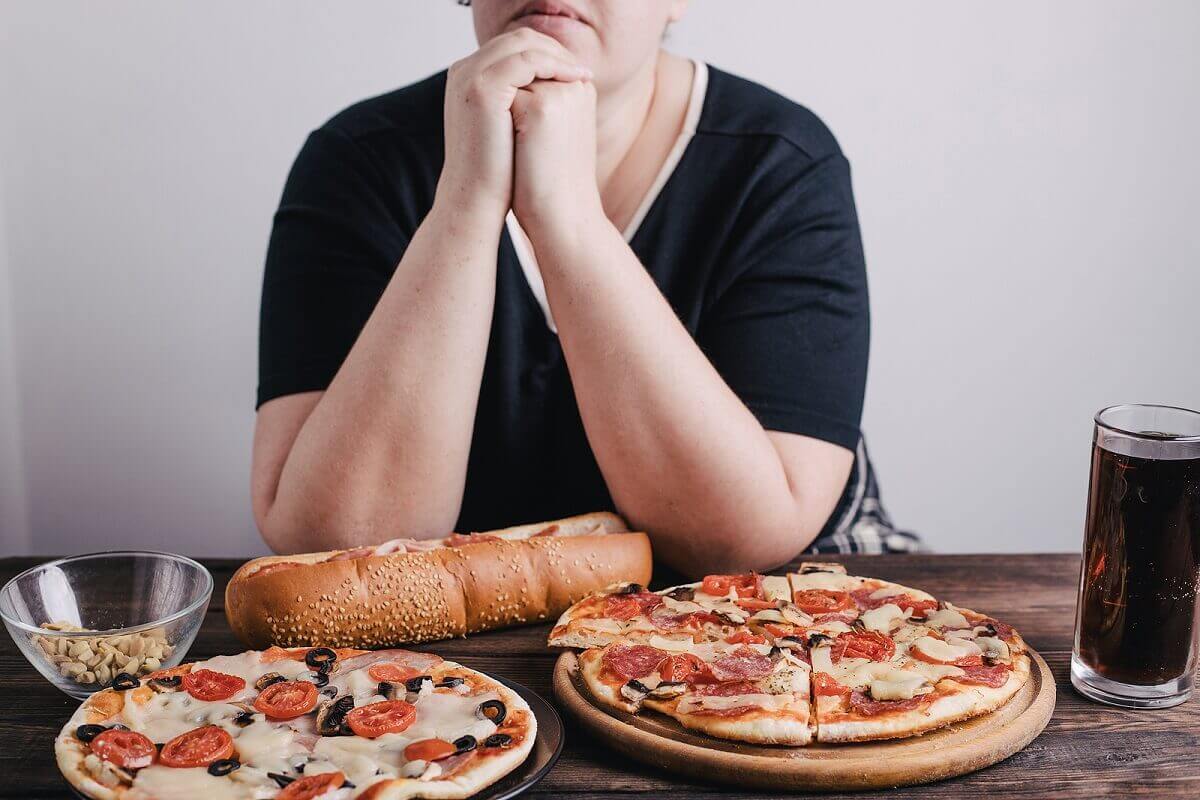I Can't Stop Eating: Causes and What To Do

Are you hungry all the time? Can’t help but raid the fridge in the middle of the night? Do you eat more than you would like and then feel guilty? If you feel you can’t stop eating, your problem is probably emotional, or at least mostly emotional.
The feeling of not being able to control your intake can be distressing, since you know that you’re not only damaging your appearance, but also your health. Despite knowing this, you just don’t know how to stop. In any case, the solution is to change your relationship with food. Here’s what to do about it.
Why can’t I stop eating?
Eating is an essential function for survival. It’s how the body obtains the nutrients it needs to function on a daily basis. The problem begins with the amount of food ingested and, especially, with the foods you choose to eat.
Those who have difficulties eating with moderation frequently opt for products with low nutritional value and high caloric index. But what leads to such harmful behavior?
Read more: The Influence of Food Processing on the Nutritional Value of Foods
Disconnection from one’s own body
One of the reasons for overeating is the inability to identify one’s own body sensations. At birth, each person is programmed to recognize the signs of hunger and act on it; in that case, crying for food.
However, as time goes by, the connection with these interoceptive sensations gets lost. This happens for several reasons. First, because food becomes associated with meetings, companionship, and interaction with others. Eating is becoming a social and pleasant act beyond its nutritional value.
On the other hand, today’s fast pace of life and stress doesn’t let us stop and listen to our body. Therefore, we start losing the ability to recognize when there’s actual hunger or when we’re actually just bored and want to share that moment of social connection.

Emotional hunger
Another aspect that makes it impossible to stop eating is emotional eating. This concept refers to using food to regulate our emotions. Have you noticed that you eat more when you’re anxious, sad, overwhelmed, or disappointed?
This has an explanation. Certain foods stimulate the brain circuit that corresponds to pleasure, since they release several neurotransmitters that produce pleasant sensations. Consequently, when ingested, relief, satisfaction, and happiness are perceived.
But, unfortunately, it’s a transitory state and not an effective or permanent solution at all. Soon after, pleasant effects disappear and unresolved emotions come back, added now to the guilt for having eaten without any self-control.
You may like: How to Prevent Emotional Eating
Restrictive diets
If you’ve been struggling with your food issues for a while, you’ve probably experienced this paradox: dieting too restrictively can increase the urge and desire to eat unhealthy food.
Embarking on an overly rigid eating style, in which food is forbidden, leads to increased anxiety about eating. Because of this, it’s impossible to follow the diet without falling into compulsive eating behaviors.
Soon after finishing this diet, you may even regain the weight you had lost after so much effort. The body is asking you for what you have taken from it and restricted so radically.

What can I do to stop eating?
Obviously, eating is essential to survive. Therefore, it’s not an activity you can avoid, as you could probably do with other types of addictions. The solution in this case is to modify your relationship with food by acknowledging its nutritional function and eating more consciously.
To do this, it’s essential to reconnect with your body and learn to listen and interpret the signals it sends. In other words, it’s about recognizing when there’s real hunger and when it may be emotional hunger due to stress or anxiety.
On the other hand, it’s important that you acquire and develop useful and effective coping strategies to deal with your negative emotional states.
The goal is to stop using food to regulate your emotions – you have to learn other ways to manage them. Emotional venting, therapeutic writing, or practicing meditation are alternatives that may be useful.
Lastly, establish a healthy relationship with food. This means that you have to stop seeing it as an enemy or as a comfort. Remember that food is only the fuel your body needs, and learn to select it based on your nutritional needs.
Eat in a healthy and balanced way, without prohibiting or demonizing any food group. Eat with moderation and, above all, while being aware of what you’re doing.
All cited sources were thoroughly reviewed by our team to ensure their quality, reliability, currency, and validity. The bibliography of this article was considered reliable and of academic or scientific accuracy.
- Sánchez Benito, J. L., & Pontes Torrado, Y. (2012). Influencia de las emociones en la ingesta y control de peso. Nutrición Hospitalaria, 27(6), 2148-2150.
- Rodríguez, S., Mata, J. L., & Moreno, S. (2007). Psicofisiología del ansia por la comida y la bulimia nerviosa. Clínica y Salud, 18(1), 99-118.
This text is provided for informational purposes only and does not replace consultation with a professional. If in doubt, consult your specialist.









